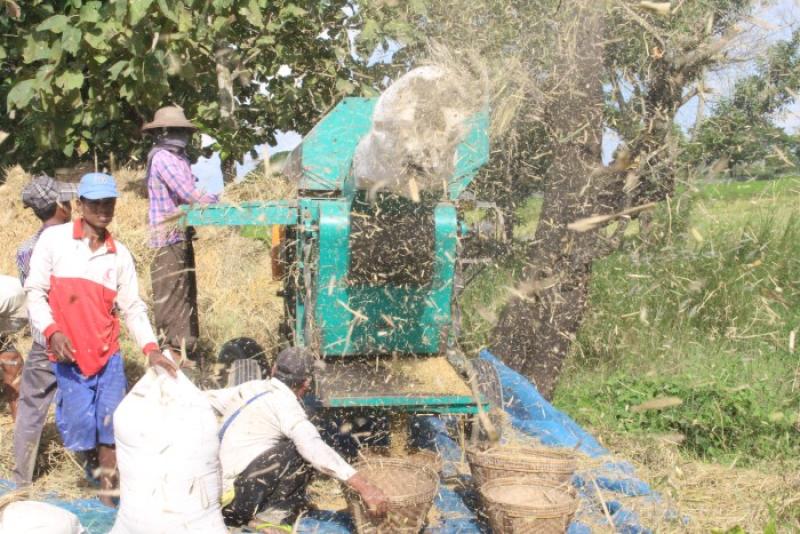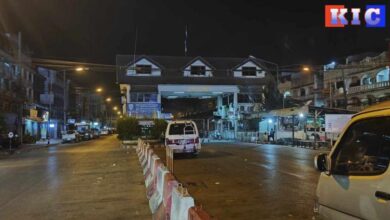*As labourers leave Myanmar delta, farmers struggle to mechanise

KWINYAR VILLAGE, Ayeyarwady Region – On a recent November morning, farmer Soe Myint Aung was busy collecting rice from his harvester and loading it into bags. It is heavy work but still he knows he is lucky; with 17 acres of paddy field situated along a road in Kwinyar Village, in Kangyidaunt Township, he can afford to own a harvester.
Most farmers in Ayeyarwady Region, the country’s ‘rice bowl’ and home to some 10 million people, lack enough land and capital to afford use of mechanical harvesters, while their uneven plots are often difficult to access with the machines.
The lack of mechanised farming has become a pressing problem, many farmers and officials here said, as manual labour is in short supply in the delta region, where farming remains labour intensive.
“Due to labour shortages farmers can’t plant their paddies in a timely manner,” Soe Myint Aung said. “Also, the harvest can be delayed and the crops could be damaged by rains; such paddy doesn’t get a good price.”
Landlessness and poverty have caused many young people to leave their villages and head to the cities – especially nearby Yangon, the country’s commercial capital, where wages have been rising in recent years.
“In some villages, young people in 75 percent of the households have migrated to other areas or neighbouring countries,” Ayeyarwady Region Minister of Agriculture Ba Hein told Myanmar Now.
“During harvest season, we have some losses as we could not harvest the crops in time because of a lack of labour,” he said. “Although agricultural machines can address labour shortages, few farmers can afford to buy these machines and the demand to rent them is very high.”
LOW YIELDS, LITTLE MECHANISATION
Myanmar’s agriculture sector was one of Asia’s largest rice exporters up until the 1950s, but productivity plummeted during decades of economic mismanagement and neglect under army rule. Hopes are now high among the impoverished farmers that the National League for Democracy (NLD) government will prioritise the sector’s development, but so far no detailed policy reforms have been announced.
A 2016 study of the World Bank and the Livelihoods and Food Security Trust Fund (LIFT) said Myanmar’s agriculture sector has the region’s lowest yields and is its most labor-intensive and least mechanised, with most farmers reliant on draught oxen to plough and labourers to harvest and process the crop.
Only 1 percent of Myanmar farmers use combine harvesters and paddy threshers, compared to 100 percent in neighbouring Thailand, the study said. It added that labour shortages make opportunities to rent machinery “vitally important” for small farmers, who need improved access to capital to be able to afford that.
GOVERNMENT SUPPORT LACKING
Ba Hein said the Ayeyawady Region’s NLD administration had been implementing similar measures as its predecessor and faced the same problems – a severe lack of funding – in supporting mechanisation and addressing other perennial problems, such as low yields, access to capital, and underdeveloped irrigation infrastructure.
He said the region’s agriculture department offers machinery for hire or purchase at subsidised rates, as private market sellers and rental services remain underdeveloped. “But we cannot fulfil all the demand as our country lacks enough budget for this,” said Ba Hein, who served as an agriculture official under the previous governments for more than two decades.
Nyein Thaung, an Agricultural Mechanisation Department official in Pathein District, said farmers could rent a simple ploughing machine for around $5 to $10 per acre, or buy it in instalments for around $1,230, while combine harvesters can be rented at around $27 per acre or bought in instalments for $27,000.
He said the services were used by around 15 percent of the farmers, but for the vast majority who own small plots the services are too expensive as they lack capital.
“These machines do not reach many paddy plots,” Nyein Thaung said, adding that only 2,100 acres – or 0.25 percent – of the 830,000 acres in Pathein District was being farmed in a modern way like in Thailand – with levelled plots, high-yielding rice varieties and combine harvesters.
Myo Chit, a farmer who owns 20 acres in Nyaunggone Village in Hinthada Township, said for most farmers the only government support they receive is an annual micro-loan provided by the Agriculture and Livestock Bank, which were raised this year from around $75 to $125 per acre.
He said he hoped the NLD government would further improve capital access for the farmers, adding, “The government should manage the (financial) support for use of agricultural machines.”
About half of all farmers in Ayeyarwady Region are subsistence farmers who own 3 acres or less, according to Ba Hein. Unless the government can find ways to raise their yields and improve access to machinery and capital, many will struggle to get by, he said, adding that they could lose their land and leave for the cities – which would further exacerbate labour shortages.
“Small-scale farmers are losing their property. As a result, social inequality is big in Ayeyarwady Region and the ‘rice bowl’ of our country is generating a large number of migrant workers,” Ba Hein said.
CONTRACT FARMING
One way to modernise agricultural methods and raise incomes of small farmers is through contract farming, in which a farmer agrees to supply his crop to a buyer at a certain time and quality. The buyer guarantees to purchase it and provides input support.
Some businessmen are investing in contract farming, which remains little developed in the delta region, but they said they face many challenges and need greater government support.
Maung Maung Win, who owns 70 acres of paddy and a rice mill in Pathein District, and works with contract farmers, said, “Our country has no law for contract farming. So, we could not persuade the farmers to turn to modern farming.”
Ayeyar Pathein Public Company has production contracts with 650 farmers in four Ayeyarwady Region townships. It supplies them with seeds, machinery and other inputs, and bought their paddy this year at around $370 per basket (around 100 kilo).
Its chairman Win Myint Hlaing said that despite guarantees of inputs and sale of their harvests, many contract farmers remain reluctant to level their land and construct roads to make them suitable for mechanised harvesters as they will lose some productive land in the process.
“Most farmers are afraid of losing parts of their plots when the land conditions are adjusted for modern farming,” he said.
Tin Linn Aung , director of the Green Peasant Institute which provides legal support for farmers, said any transition to modern farming in Myanmar would require great changes from both farmers and government.
He stressed that new government policies should be developed in consultation with farming communities, so they can understand the plans and their concerns can be heard.
“The government should adopt clear plans for the transformation to modern farming systems. The public can only be convinced of this system if they understand the advantages well,” he said. “Farmers should be involved in the process of the amending and adopting new farm laws.”
*This article first appeared on Myanmar Now on 29/11/2016.




